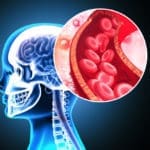TMS (Transcranial magnetic stimulation) uses a current that passes through a metal coil that’s placed against the head, The coil generates magnetic fields that rapidly alternate. A hypothesis of how TMS works is that it enhances the functioning of neurological pathways that are involved with mood regulation. A multitude of clinical studies and almost 15 years of my own clinical experience has demonstrated that TMS is extremely well tolerated with few if any side effects for most patients.
TMS and Headaches
Mild, transient headaches are the most common side effect of TMS. A review of randomized trials in patients with major depression demonstrates the incidence of headache with active TMS is about 28%. Headaches, when they do occur, almost always dissipate as the sessions continue, resolving within the first week during a course of TMS.
No migraine headaches have been reported. In fact, many people with migraines have a decrease in the severity and frequency of migraine headaches as a result of TMS.
How to Address Headaches caused by TMS
Even though TMS can cause headaches, there are ways to treat the side effect. For example, the intensity of TMS can be lowered. Over-the-counter analgesics such as Ibuprofen or Acetaminophen can also be used and are almost always effective.
Mid City TMS is Here to Help
If you suffer from depression and are wondering what your next options should be, contact Mid City TMS today to learn if you may be a good candidate for TMS treatment. Suffering from depression is debilitating and having to deal with the side effects of antidepressants can take a toll on your body and your mind. Consider the TMS treatment with Mid City TMS today.



